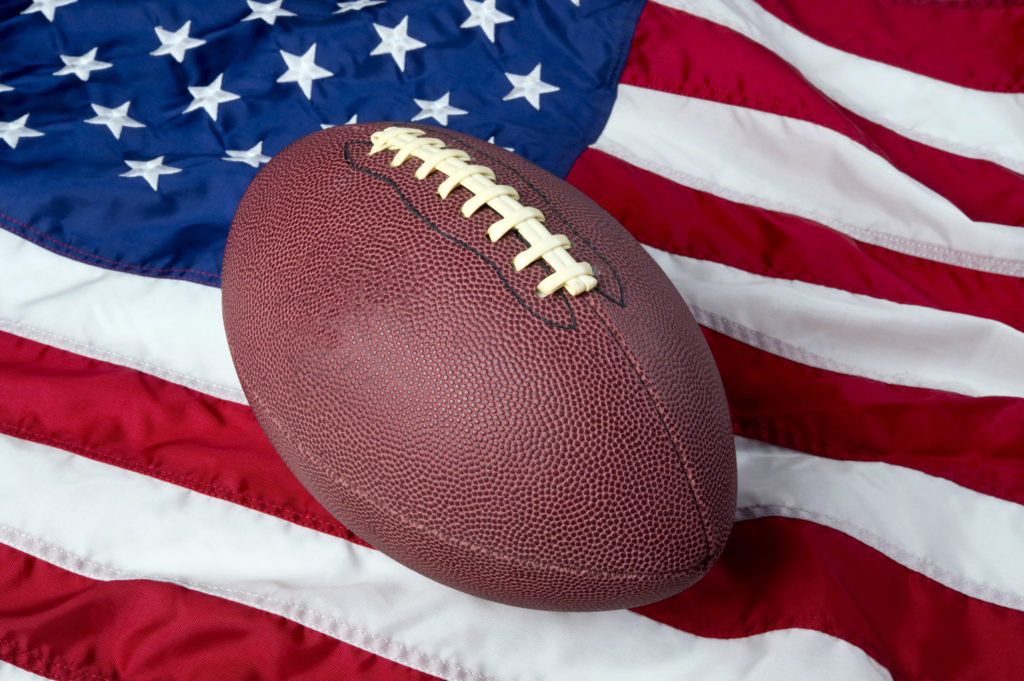 What did your morning show talk about today?
What did your morning show talk about today?
Did they yuck it up about Kylie Jenner’s baby bump, discuss that new study about how sleep deprivation may be killing us, or did they take a listener poll on how the shape of your face determines your sex drive?
Or did they talk about President Trump’s tweeting? Or all those National Anthem moments that occurred in yesterday’s NFL Games?
…our Great American Flag (or Country) and should stand for the National Anthem. If not, YOU’RE FIRED. Find something else to do!
— Donald J. Trump (@realDonaldTrump) September 23, 2017
Did they execute yet another edition of “War of the Roses?” Or did they talk about Steph Curry, LeBron James, and championship sports teams not accepting those White House invitations?
Problem is, just about every story in and out of sports these days reeks of politics.
Last week, sports radio consultant and fellow blogger, Jason Barrett, wrote a compelling post that is actually more like a novelette. “This Fire Is Out of Control and ESPN Can’t Put It Out” is a great read and the jumping off point for this post.
It’s long, but I encourage you to read it. Starting with ESPN’s current Jemele Hill controversy and working his way through other suspensions and firing at the world’s most famous sports network, Jason provides a frank discussion of the politics of sports.
If you’re not aware of this tangled, mess, Hill (co-host of ESPN’s SC6) launched a tweet storm last week highly crucial of President Trump. I’m lifting these tweets directly from Jason’s post:
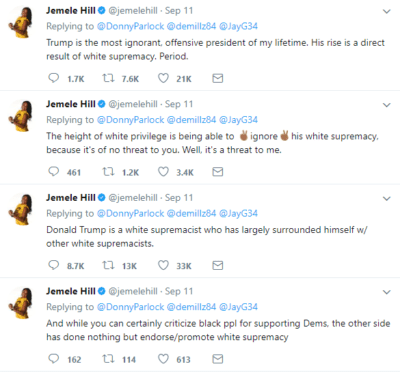
Jason acknowledges that politics are a part of sports, but also points to numerous sports media personalities – Jim Rome, specifically – who makes it a point to “stay in his lane” and remain apolitical on the radio.
In the end, Jason says the best option for the troubled sports network is to “take the position that no employee at ESPN is allowed to publicly discuss politics on their social media feeds.”
And his conclusion is a simple one – stick to sports and be true to your brand. In his own words:
“Sports isn’t supposed to be a right or left choice. But when on-air talent wander into areas that the audience doesn’t tune into them for, the relationship between host and viewer/listener can suffer. It’s critical to know what your brand is, what the audience expects, and then satisfy those expectations. It may sound silly but sometimes it pays to stick to sports!”
Yet, in many ways, the controversies brewing in the sports world around race have been occurring for years. And yes, they’ve often had political overtones. Jackie Robinson, Jesse Owens, Jose Feliciano’s version of the “Star Spangled Banner” at the ’60 World Series, and the Black Power salute during the ’68 Olympics in Mexico City were all uncomfortable confluences of sports, race, and politics.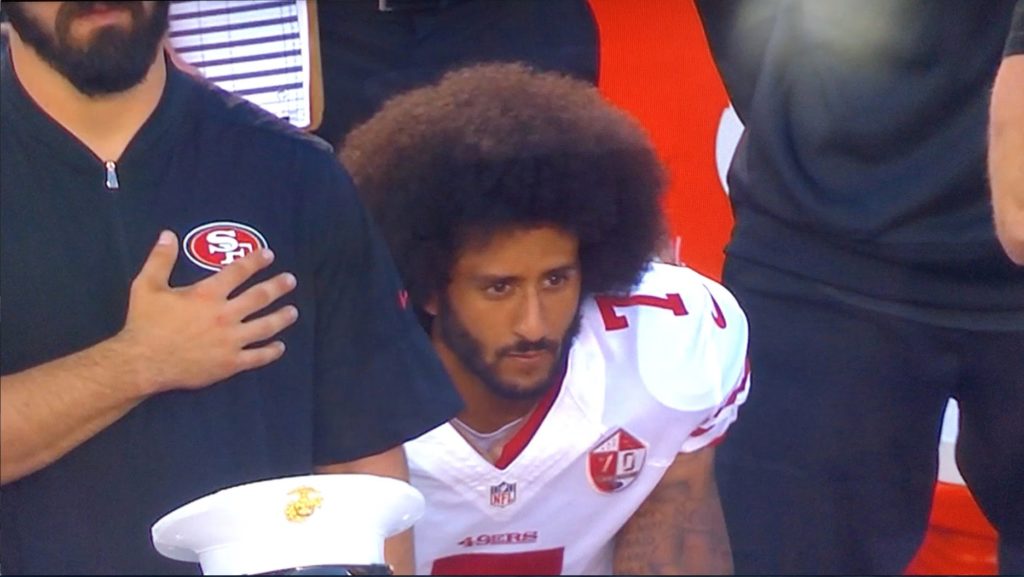
Before Muhammed Ali became a beloved American icon, he was the oft-reviled Cassius Clay, dodging the draft and the Vietnam War. In many ways, Colin Kaepernick is the Cassius Clay of his time.
It got even more complicated over the weekend when the Golden State Warriors were “disinvited” by President Trump to the White House – an event they were planning on skipping anyway. And the best player in the game, LeBron James weighed in with an angry tweet storm of his own.
Going to the White House is considered a great honor for a championship team.Stephen Curry is hesitating,therefore invitation is withdrawn!
— Donald J. Trump (@realDonaldTrump) September 23, 2017
— LeBron James (@KingJames) September 23, 2017
We can hope that athletes just play the game, and sports reporters on radio and TV simply give us the scores. But that would deny the inconvenient truth that politics – as the saying goes – is life. And these days, it is an inescapable part of the American narrative. If anything, politics has intensified our lives, forcing us to take sides, take a stand, say something, or at least think about what it all means to us as Americans.
But politics transcends sports and works its way into the entertainment and music.
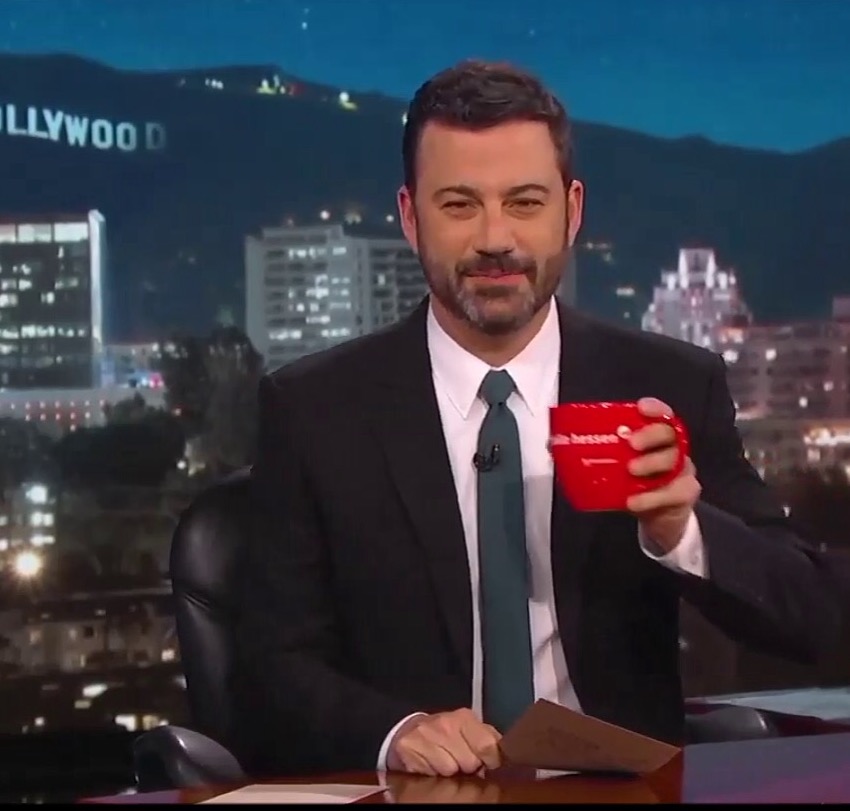 This past week, the focus of Jimmy Kimmel’s monologues have been the Graham-Cassidy healthcare bill. For Kimmel, it’s personal. He’s recently experienced serious heath issues with his infant son born with heart problems. While his family is totally covered by a generous Disney health plan, the issue of coverage for all Americans has become a focal point. And he’s used his shows as a pulpit to debate the issue with Senator Cassidy.
This past week, the focus of Jimmy Kimmel’s monologues have been the Graham-Cassidy healthcare bill. For Kimmel, it’s personal. He’s recently experienced serious heath issues with his infant son born with heart problems. While his family is totally covered by a generous Disney health plan, the issue of coverage for all Americans has become a focal point. And he’s used his shows as a pulpit to debate the issue with Senator Cassidy.
If that’s not why you watch late night TV, you can always grab the remote and flip to Stephen Colbert, Seth Myers, Conan O’Brien, and Jimmy Fallon. But that’s no guarantee you’ll escape the body politic. If you’re looking for comedy, entertainment, and escape, beware because late night TV has become a hotbed of political discussion and parody, too.
For the sports radio world, political overtones and ramifications are as inevitable as death and taxes. But even for music stations, politics is simply part of a conversation that must be had, even if the decision is to ignore it. More and more, even milquetoast morning shows are playing monologues from some of the aforementioned late night hosts as a way to stay current without taking sides.
The Emmy Awards a couple of Sunday nights ago was another case in point. Sean Spicer’s appearance sparked controversy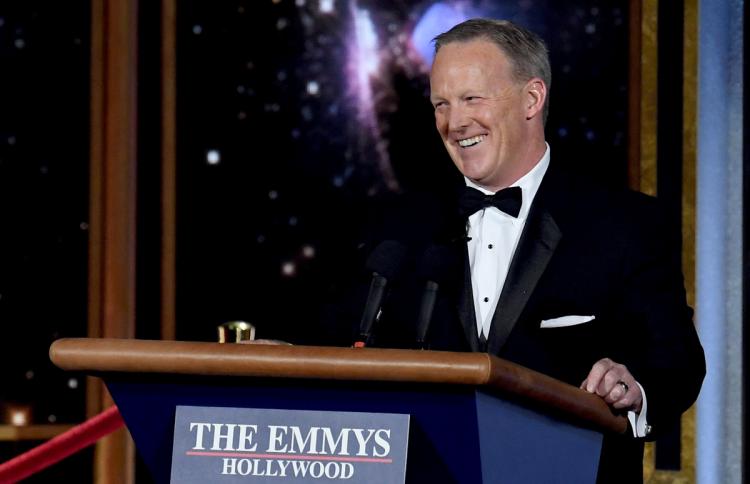 – in the theater, in social media, and perhaps on your airwaves as people on both sides had a visceral reaction to seeing him on that Emmy stage.
– in the theater, in social media, and perhaps on your airwaves as people on both sides had a visceral reaction to seeing him on that Emmy stage.
On the eve of her new NBC News talk show, Megyn Kelly complained in an interview with TVNewser:
“Must everything be political? Everything? EVERYTHING? I’m sick of it. And I’m not the only one.”
Maybe she’s got a point, and her new persona will turn out differently than her image at Fox News. But the environment is white hot as we saw once again during a September weekend – a time when the world used to take a breath, kick back, and relax.
These raging political times demand management and talent should at the very least have a conversation about the station’s position, how personality shows fits in, and the overall social media policy – for starters.
Jason Barrett may be right. At the end of the day, the decision might be to tacitly position your station or your show as an escape from all the political animals. That’s a valid strategy.
But if you don’t have an understanding with your P.D., your talent, and the staff, anything can happen – as ESPN is finding out.
As consultants love to say, there is no one-size-fits-all solution. You’re going to have to hack your way through this mess on your own.
But whatever you do, have the conversation.
Meanwhile, could you believe the end of the Lions game?
- What To Do If Your Radio Station Goes Through A Midlife Crisis - April 25, 2025
- A 2020 Lesson?It Could All Be Gone In A Flash - April 24, 2025
- How AI Can Give Radio Personalities More…PERSONALITY - April 23, 2025




But is kneeling a sign of disrespect? I can finger a lot worse that’s clearly insulting to God & Country. Let’s move to the essentials. BTW, the end of the Pats game was Tom Terrific!
Clark, clearly an issue that gets everyone’s juices flowing which is why the discussion over whether to engage or not is so critically important. As for the Patriots, they’re not the Lions, that’s for sure.
Thought provoking as always Fred! What stood out to me was the solidarity of the team management and owners. If you ever been a part of winning team, combat unit, or start-up, you know how important commitment, loyalty, and collaboration are. When you respect your team, even when you might not agree with them, it creates a bond that is hard to break.
I don’t like the way they chose to be silent, but I LOVE the support and respect the owners and managers have shown.
#Loyalty
As you point out, Gene, teams are more like tribes. Teammates may have fundamental differences in every possible way, but they’re taught to come together and support each other. I think that’s what we’re seeing. Thanks for the comment.
I respectfully disagree with Jason’s premise here. This is not a black or white issue. ESPN can have a social media policy that allows for discourse on other subjects than sports while still providing the kind of on air content that its audience expects. Unfortunately for ESPN, the network has been woefully inconsistent in its reaction to how its hosts/commentators handle the political spectrum. The reality that politics and sports have intersected for a very long time, and to be candid, there is no escape from it, at least not in the world of Trump. Sports fans are not only interested in sports, and when players/coaches etc wade in to this territory, sports fans want to hear about it and discuss it. Stick to sports is a safe play, but it’s a cop out, and I think that stations who force that position will not only lose audience, but credibility with their listeners.
On the sports radio front, you may be right, Jason. For music formats, it’s much murkier. Jason Barrett did a nice job of describing the schizophrenia ESPN is suffering from as these eruptions continue to occur. But I agree that for a major network, smart broadcasters, and tuned-in hosts, it’s hard to maintain complete neutrality in this environment. In many ways, NPR is experiencing this, too. And while they’re ratings are excellent, that squishy feeling is unmistakable. Just report, stick to news, and provide perspective and maybe opinion? Every news organization is dealing with these questions. Thanks for the comment.
I think we are dealing with a case of short memory here. There wasn’t an album rock or so called underground radio station worth listening to that didn’t comment on Nixon and the Vietnam war daily and hourly. If you were a George Wallace for President fan you didn’t like it. If you were a John Lennon fan you expected it. I like Jemele Hill on a personal level and she is a talented media personality. On the question of her mixing politics with sports I ask you to weigh this……..if your local conservative Pastor can mix Jesus with Trump when on the pulpit why not football and Trump on ESPN. Good post today, Fred.
Dan, strong comment, as always. The Nixon/Vietnam period perfectly coincided with an FM radio environment where even the owners didn’t understand what was going on. Not so today. These are different times, but I think we’re watching celebrities and sports stars reach that point where many feel the need to express themselves. It’s interesting that on radio – where it began in the ’60s – is the last place it’s happening today.
I hope morning shows understand the more subtle point Fred makes, and that is- you must decide what you want your show to be (politics or no politics) and stick to it. Throwing whatever against the wall to see what sticks isn’t a good strategy.
Tommy, you said it more succinctly than me. Stations and shows need to approach politics with a plan. Otherwise…
I’ve often toyed with the idea of a segment just being honest with the listeners: “we’re not clueless, we know this is happening…but talking about it will just suck the fun out of the show, so we’re not going to.” Bob & Tom do it pretty well with their “there’s nothing funny down that road” bit.
A little honesty and authenticity could go a long way, Brian. Thanks for the comment, Brian.
Fred, I believe referring to Ali as a “draft dodger” is contemptible. There is a huge difference between accepting the consequences (which Ali did) of declaring himself a Conciencious Objector and being a so called “draft dodger.” Ali paid dearly to live his faith.
Carmen, I should have been clearer in the post about Ali/Clay. Back in the day, that was how he was considered by many Americans during that frantic period. I spoke of him in the post – and in subsequent tweets – with respect and the reverence he deserves. My clarity in the post could have been better. Thanks for bringing it to my attention.
Thank you for the clarification, Fred.
Some shows and formats are not geared for to talk about anything remotely controversial but the simple fact is a strong opinion always wins out over wishy washy on radio and in politics as well.
Look at someone like Alex Jones who has made a career on confidently spouting lies. Of course he came out and admitted that he is a “performance artist” (i.e. full of crap). What 40% of the country does not understand is we elected a “performance artist” as President and he is throwing out lots of non-issues to keep everyone’s attention off the fact that he too is a fraud.